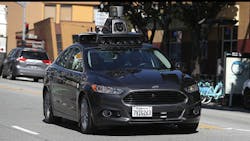Waymo's Case Against Uber Sent by Judge to US Prosecutors
The judge presiding over Waymo’s trade-secrets theft lawsuit against Uber Technologies Inc. asked federal prosecutors to investigate the claims in the case, a dramatic turn in a closely watched fight that could influence the future of driverless cars.
U.S. District Judge William Alsup in San Francisco said in Thursday’s brief order he takes no position on whether prosecution is warranted.
The specter of a possible criminal inquiry has hung over the case for weeks, ever since a lawyer for the engineer at the center of the dispute, Anthony Levandowski, said he could potentially be the subject of a criminal investigation.
The lawyer cited Waymo’s explosive allegations that Levandowski downloaded thousands of proprietary files at the Alphabet Inc. unit before he left. He later joined the ride-hailing giant. Levandowski has refused to testify in the lawsuit, citing his constitutional right against self-incrimination.
Alsup said at a May 3 hearing that Waymo hadn’t presented “smoking gun” proof of wrongdoing by Uber, while emphasizing that the evidence strongly suggested that Levandowski downloaded files that Waymo accused him of stealing. When Alsup asked Uber directly if the company could deny Levandowski’s alleged download, Uber’s lawyer said no.
Uber declined to comment on the referral to prosecutors, as did a spokesman for Waymo. Levandowski’s criminal lawyer, Miles Ehrlich, didn’t immediately respond to an emailed request for comment on the referral sent after regular business hours.
Abraham Simmons, a spokesman for the U.S. Attorney’s Office in San Francisco, didn’t immediately respond to a request for comment sent outside regular business hours.
‘Serious’ Implication
Alsup’s referral of the case to federal prosecutors complicates the litigation for Uber, said Jim Pooley, a Silicon Valley intellectual property lawyer who isn’t involved in the case.
“There’s an implication that the judge sees something serious enough that it deserves the attention of authorities to consider whether a crime has been committed,” Pooley said.
Uber’s lawyers have considerable influence over the civil case, and could settle it, he said.
“The potential for an actual criminal proceeding makes it that much more difficult to control, or affect the ultimate outcome of the dispute.”
Uber’s Woes
Uber has been beset by a cascade of woes lately, including an exodus of top executives as it investigates claims of sexual harassment and a toxic work culture. It’s also the target of a federal criminal probe over its use of a software program called Greyball to deceive government officials. Chief Executive Officer Travis Kalanick said he would seek to enlist a chief operating officer after apologizing when he was videotaped arguing with a driver.
Alsup earlier Thursday issued two crucial rulings against Uber in the civil case -- one denying the company’s request to send the claims into closed-door arbitration and the other partially granting Waymo’s request for restrictions on its rival’s driverless-car program.
The arbitration ruling leaves Uber on course for an October trial in open court over claims that it gained an unfair advantage by ripping off crucial technology in the race to market autonomous cars that both companies believe will be worth hundreds of billions or even trillions of dollars a year.
“This was a desperate bid by Uber to avoid the court’s jurisdiction,” Johnny Luu, a spokesman for Waymo, said in an emailed statement about the arbitration ruling. “We welcome the court’s decision today, and we look forward to holding Uber responsible in court for its misconduct.”
Chelsea Kohler, a spokeswoman for Uber, said it’s “unfortunate that Waymo will be permitted to avoid abiding by the arbitration promise it requires its employees to make.”
“We remain confident in our case and welcome the chance to talk about our independently developed technology in any forum.”
Sensitive Information
Waymo had asked the judge to effectively shut down Uber’s program to keep it from using the allegedly stolen secrets. In an order issued Thursday that was sealed from public view, Alsup partly granted and partly denied Waymo’s request for a preliminary injunction, without elaborating.
Alsup said he intends to issue a decision publicly after both sides provide input on which portions should be redacted because they contain sensitive company information.
One of the range of options at the judge’s disposal that he floated in court was an order walling off Levandowski from Uber’s project.
Lesser Role
The judge’s orders Thursday come two weeks after Levandowski stepped down from his post overseeing self-driving car technology to a lesser role on the team, saying he and CEO Kalanick decided he shouldn’t be involved with the laser technology at issue in the lawsuit.
In the arbitration ruling, Alsup noted that Uber was trying to steer the lawsuit into arbitration despite having “no agreement with anyone to arbitrate the case.”
In arbitration, the companies would have been able to choose an intellectual property expert to referee their dispute. Arbitrators, who are usually lawyers or retired judges, are required to keep proceedings confidential, including final outcomes, but parties can speak publicly about awards unless they’ve agreed to keep quiet, according to Charlotte Garden, an associate law professor at Seattle University.
Arbitration would have benefited Uber primarily by keeping the case out of the public spotlight and also by limiting the scope of information sharing.
“Plaintiffs generally have greater need to dig up information to prove their cases,” Garden said.
Engineer’s Contract
Uber argued that even though Levandowski isn’t named as a defendant in the lawsuit, which was filed in February against Uber and Otto, the dispute doesn’t belong in court because the engineer’s contract with Waymo contained a broad arbitration clause.
Waymo said it never consented to arbitrate the dispute with Uber and contended it couldn’t be coerced into an informal resolution process just because the trade secrets it’s fighting to protect happen to have come from former Waymo employees.
Separately, Waymo initiated arbitration proceedings against Levandowski in October, claiming he breached the confidentiality provisions of his contract and improperly used the company’s private information to recruit colleagues for a competing driverless-car enterprise.
By Joel Rosenblatt and Peter Blumberg
About the Author
Bloomberg
Licensed content from Bloomberg, copyright 2016.


